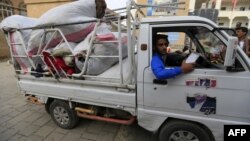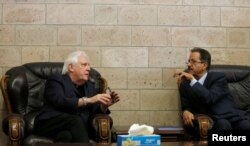Sources close to U.N. Yemen envoy Martin Griffiths say the Houthi rebel group that controls chunks of the country, including the capital Sanaa, may be willing to hand over control of the Red Sea port of Hodeida to a U.N. team to administer.
Arab media says that the Houthis are denying the claim.
Scattered fighting continued in and around Hodeida on Friday as the Saudi-led coalition and Yemeni forces loyal to the internationally-recognized government consolidated gains around the city and made small advances in several places.
Saudi-owned al Arabiya TV claimed the government of Abdrabbou Mansour Hadi now controls around 85 percent of Yemen. VOA could not independently confirm the claim.
Despite reports that the Iranian-backed Houthis are losing ground, the group's leader, Abdel Malek al Houthi, claimed reinforcements are being brought in to bolster forces loyal to his group.
He thanked everyone who came from the provinces to help his forces, but said recruitment must take place through the defense and interior ministries and that men must be taken from the coastline itself.
Arab media report that the Saudi-led coalition has cut the road from Sanaa to Hodeida, whose port supplies the capital with the majority of its supplies. The Houthis deny the claim.
Veteran Saudi commentator Jamal Khashoggi said the Saudis are applying classic military strategy by cutting the road because Hodeida is "a major supply line to the Houthis. It is a major source of Yemeni revenue. Goods that come through the port, they tax it."
Rights groups have warned that taking Hodeida will seriously exacerbate the humanitarian crisis in Yemen, but Khashoggi suggested that the coalition will "avoid the city" because going in "could lead to what the Europeans and the Americans are worried about: a bloodbath."
Khashoggi said the Houthis have serious problems on the battlefield in many parts of Yemen, since they are not widely liked.
Still, Adam Baron, a visiting fellow at the European Council on Foreign Relations, told VOA he is not optimistic the Houthis are ready to start negotiating with U.N. envoy Martin Griffiths.
"In general, I'd say the Houthis are willing to engage in negotiations if it's in their own interests," he said. "Let's face it, when it comes to the substantive issues, there's still a large gap between what the Houthis are willing to offer and what the Coalition is willing to accept, and vice versa."
Yemen analyst Gregory Johnsen, who works for the Arabia Foundation and has spent several years on the U.N. Security Council's Yemen Panel of Experts, said the United Arab Emirates, which is leading forces in the battle for Hodeida, is being very methodical in its pursuit of the war:
"They're trying to be as deliberate as possible and not just go in and try to push the Houthis completely out of the city of Hodeida," he said. "But they're taking it step by step."
The first part was taking the airport.
"They've now done that," he added. "They're consolidating that. The second step has been cutting the road to Sana'a. They're doing that, and then they'll move on to the next step."
Johnsen argues the UAE is "trying to slowly ratchet up military pressure on the Houthis ... to force them to capitulate and agree to some of the terms of Griffiths."
He said the Saudi coalition is trying "to make sure that ships can still offload and that aid is still coming in, not only to Hodeida, but to the rest of the country."
Saudi coalition spokesman Colonel Turki al Maliki told journalists in Brussels on Friday that the coalition hopes to get the Houthis to the negotiating table.
He said coalition forces are hoping for a political solution to Hodeida, Sanaa, and the Houthis' home region of Saada. A political solution, he said, is the best solution for the Yemeni people to end the conflict.
Maliki added countries that support the coalition have earmarked $1.5 billion for aid efforts in various regions of Yemen.






